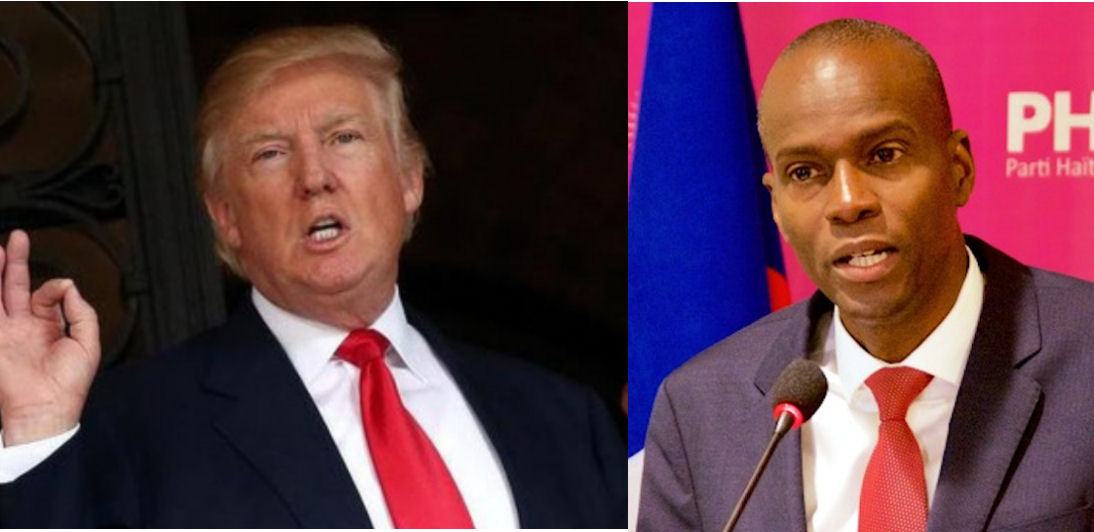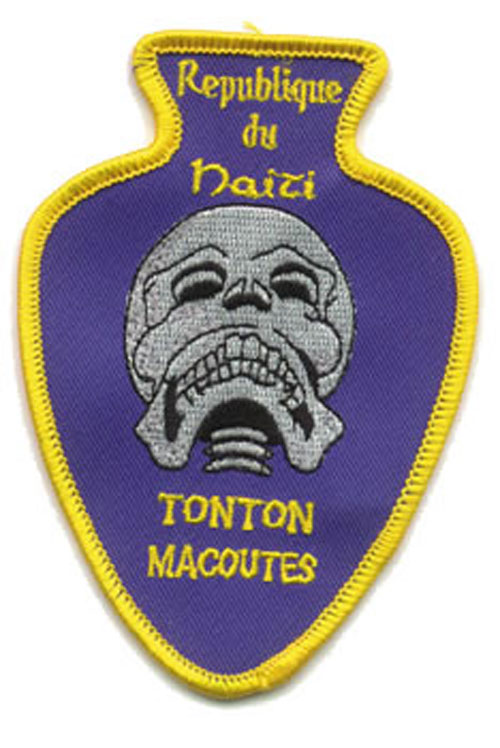Latin America
Related: About this forumIs democracy in Haiti eroding? The president's new intelligence agency has many uneasy
BY JACQUELINE CHARLES
DECEMBER 12, 2020 04:06 PM, UPDATED DECEMBER 12, 2020 05:07 PM
Public criticism of Haitian President Jovenel Moïse’s administration by the international community continues.
Representatives of the international community in Haiti, known as the Core Group, are expressing concerns about two presidential decrees recently issued by Moïse. One of the orders creates a national intelligence agency. The other was published under strengthening public security and expands the definition of terrorism.
The decrees were published on Nov. 26 in the government’s official newspaper, Le Moniteur. Since becoming public, they have been the subject of heavy criticism from the Port-au-Prince Bar Association, human rights defenders and opposition leaders who say they risk creating repression in a country still trying to overcome its dictatorship past.
Now the Core group, which consists of representatives of Germany, Brazil, Canada, Spain, the United States, France, the European Union and the special representative of the Organization of the American States and the Secretary General of the United Nations, is also expressing its uneasiness.Under both decrees, the power of the executive is strengthened. He has unbridled power over a new agency known as the National Intelligence Agency, or ANI, and public security. According to the agency decrees, agents akin to secret police officers will have immense and unlimited powers, and are accountable only to the president.
The second decree extends the definition of a “terrorist act” and provides heavy penalties from 30 to 50 years in prison for violators, which can include Haiti National Police officers failing to quell street demonstrations or demonstrators burning tires on public roadways.
More:
https://www.miamiherald.com/article247803995.html

Donald Trump, President Jovenel Moïse

What a horrible shame. Haiti has already had a nightmarish history with monsterous people doing Papa Doc's bidding, the Tonton Macoutes.
secondwind
(16,903 posts)Haitians have a hard time as it is, and I have always been sympathetic to their crossing over to our side, albeit illegally. I would probably do the same.
Now they are also birthing babies in our hospitals, something I also am not against, but there are folks here who are grumbling excessively.
Why can't we all just live in peace................... ![]()
Judi Lynn
(164,067 posts)by LESLIE ALEXANDER
In 1826, Southern antagonism towards Haiti erupted on the floors of Congress, when John Quincy Adams proposed that the United States should participate in a conference of independent American nations at which Haiti might also be represented. In response, Southern congressional leaders unleashed their fury in a tirade against the Haitian republic, spewing racist propaganda and insisting that Haitian independence must never be recognized.
Years later, during a speech in 1893, abolitionist Frederick Douglass aptly described the U.S. government's response to the Haitian Revolution as a demonstration of Americans' discomfort with Black freedom and self-determination. "Haiti is black, and we have not yet forgiven Haiti for being black…After Haiti had shaken off the fetters of bondage, and long after her freedom and independence had been recognized by all other civilized nations, we continued to refuse to acknowledge the fact….and treated her as outside the sisterhood of nations."
French Debt, Haitian "Freedom"
Until 1825, the U.S. government could easily justify their non-recognition policy on the grounds that its ally, the French government, was unwilling to recognize the independence of its former colony. From a purely diplomatic standpoint, it would have been a poor strategic decision for the United States to acknowledge Haiti if the French refused to do so.
That changed in 1825. In order to gain diplomatic recognition, and to gain entrance into the global trade arena, the Haitian government entered into a very costly agreement with France.
France agreed to recognize Haiti as a sovereign nation, but demanded that Haiti pay compensation and reparations in exchange. The Haitians, with their diplomatic and economic backs against the wall, agreed to pay the French.
The French government sent a team of accountants into Haiti in order to place a value on all lands and physical assets, including the 500,000 citizens who were formerly enslaved, and declared the value at 150 million gold francs, which in contemporary terms would equate to well over $20 billion.
Payments began immediately. And although Haiti was finally able to officially "buy" its economic freedom and diplomatic recognition, the debt of 150 million francs was a massive burden from which Haitians have never been able to fully recover.
More:
https://origins.osu.edu/article/pact-devil-united-states-and-fate-modern-haiti/page/0/1
Judi Lynn
(164,067 posts)For nineteen years, the United States controlled customs in Haiti, collected taxes, and ran many governmental institutions, all of which benefited the United States. In 1922, for example, the United States extended Haiti a debt consolidation loan that was designed to pay off its remaining debt to France. But in many ways, Haiti simply exchanged one master for another. Although Haiti was finally free of its debt to France, it now had a new creditor—the U.S. government and the U.S. banks who made a small fortune off the loan arrangement.
Although the United States finally withdrew troops from Haiti in 1934, the U.S. government still maintained fiscal control over the country until 1947, when Haiti finally paid off its loan to the United States. In order to do so, however, Haiti was forced to deplete its gold reserves, leaving the country bereft. Perhaps more importantly, the removal of the U.S. military did not result in the removal of U.S. influence in Haiti.
The Duvalier Years
As the Cold War set in after World War II, the most devastating impact of U.S. interference in Haiti was the government's ongoing support of the Duvalier regime, which ruled Haiti from 1957 to 1986. Fearful that Haiti would fall to communism, the U.S. government concluded that it would offer full support to the Duvalier government.
During that 30-year period, Haitians were forced to live under dictators "Papa Doc" and "Baby Doc" Duvalier, a father and son team, who openly murdered their opponents and stole millions of dollars from the Haitian people. Some members of the Haitian leadership have since claimed that the Duvaliers stole close to $1 billion. Even so, both Duvaliers enjoyed the backing of the United States because of their staunch "anti-communism" and the economic opportunities that Haiti offered American business.
Judi Lynn
(164,067 posts)DECEMBER 17, 2020
What’s Inside Haiti’s New Security Decrees: An Intelligence Agency and an Expanded Definition of Terrorism
BY JAKE JOHNSTON – KIRA PAULEMON
On November 26, 2020, the Haitian government published two decrees on national security. The first creates a new national intelligence agency, while the second greatly expands the definition of terrorism. Haitian president Jovenel Moise has been ruling by decree since January when the terms of parliament expired, and has used that power to consolidate the strength of the executive branch. The government has framed the changes as a response to recently increasing insecurity, however the Port-au-Prince Bar Association and various human rights organizations have denounced the new decrees and warnedthat they could be used to increase repression.
Marie Suzy Legros, the head of the bar association, labeled the decrees as “tyrannical” and as the destruction of liberty. “Jovenel Moise has the madness of a dictator,” former Senator Steven Benoit commented in response to the decrees. “He does not realize that we are no longer in 1957,” he continued, in reference to Francois “Papa Doc” Duvalier who created his own intelligence agency in the early years of the dictatorship. Even before these recent decrees, 11 human rights organizations had condemned the “dictatorial and unconstitutional” actions of the current administration.
On December 12, the Core Group in Haiti issued a press release “expressing concern” over the new decrees. The Decree on the Strengthening of Public Security, the diplomatic representatives note, “extends the qualification of ‘terrorist act’ to certain facts that do not fall under it and provides for particularly heavy penalties.” The intelligence agency, the Core Group, continued, gives “the agents of this institution virtual legal immunity, thus opening up the possibility of abuse.” Taken together, these decrees “do not seem to conform to certain fundamental principles of democracy, the rule of law and the civil and political rights of citizens.”
So, what is in these new decrees?
A New Intelligence Agency
The National Intelligence Agency (ANI by its French acronym) is a technical and administrative institution, whose primary focus is on information gathering and the repression of hostile acts that could be perceived as a threat to national security. Though the new agency will operate under the auspices of the Ministry of the Interior, the president has the sole authority to name a director general and other high-level positions (Art. 54).
The ANI will be staffed by individuals recruited from the National Police Academy and from the military. The decree includes scant information on the vetting of ANI officers, but notes that recruits will be subject to testing as well as to psychological and moral inquiries (Art. 32). The officers, whose identities will remain anonymous due to national security concerns, will also be armed (Art. 51) . The decree also grants total secrecy to the ANI’s operations. The ANI is authorized to conduct surveillance and will have access to all relevant government databases. Officers will also be able to enter private homes or businesses at any time in order to access documents, objects, or anything else relevant to an ongoing investigation (Art. 55).
More:
https://www.counterpunch.org/2020/12/17/whats-inside-haitis-new-security-decrees-an-intelligence-agency-and-an-expanded-definition-of-terrorism/
